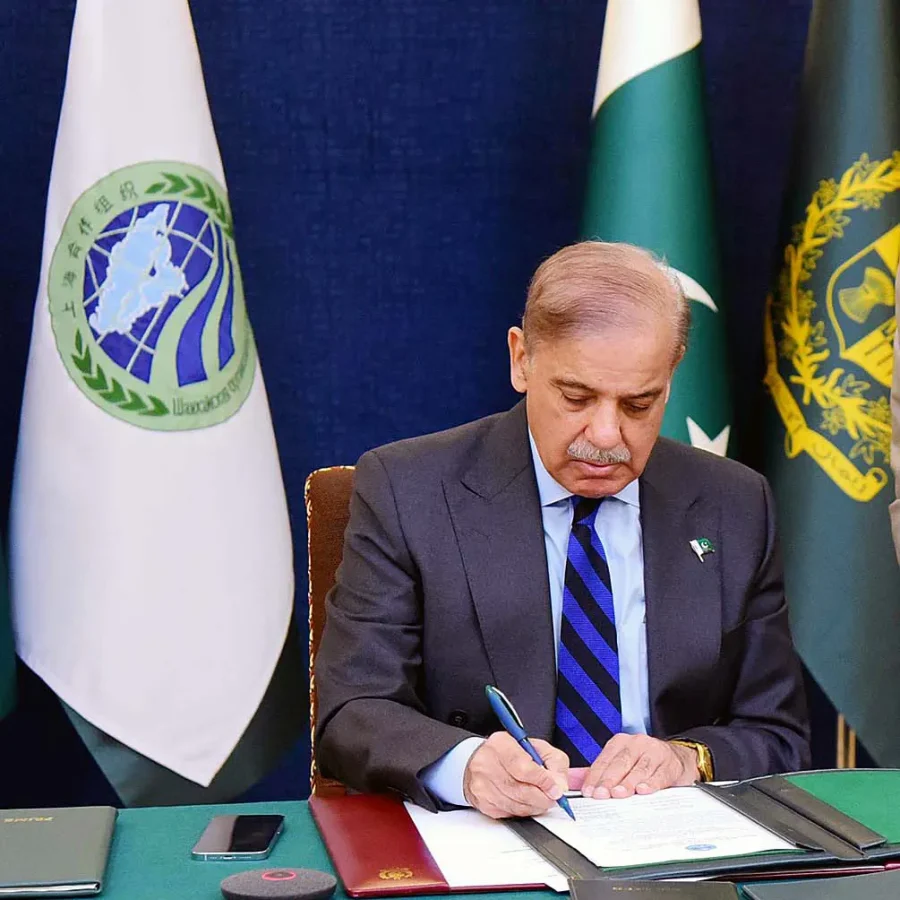Prime Minister Shehbaz Sharif has reaffirmed Pakistan’s unwavering support and commitment to address common challenges and realize the shared dreams of peace, prosperity, stability and enhanced connectivity in the SCO region.
Addressing the 23rd meeting of SCO Council of Heads of State through video link on Tuesday, he asked the SCO countries to take immediate actions both in their national capacities as well as collectively to combat the three evils of terrorism, extremism and separatism.
He stressed that terrorism and extremism whether committed by individuals, societies or states must be fought with full vigour and conviction.
Shehbaz Sharif said terrorism in all its forms and manifestations including state terrorism must be condemned in clear and unambiguous terms. There can be no justification for the killing of innocent people. Similarly religious minorities should never be demonized in the pursuit of domestic political agendas.
The Prime Minister said fundamental rights and freedoms must be guaranteed to all including those under occupation. He said peace and communal harmony should replace violent ultra-nationalism and xenophobic ideologies especially Islamophobia.
He said we should resolutely oppose divisive policies based on prejudice and discrimination. There should be no place for the wilful provocations and incitement to hatred especially on religious grounds.
Shehbaz Sharif pointed out that the SCO stands for observance of the UN principles of sovereignty, territorial integrity and people’s right to self-determination.
We must ensure these universally recognized principles within the SCO borders for friendly relations amongst the nations. He said the UN Security Council resolutions offer us a workable framework for the resolution of some longstanding disputes in the region. These must be addressed to immediately and settled amicably before it is too late.
Highlighting the significance of a peaceful and stable Afghanistan to unlock the true economic potential of the SCO region, the Prime Minister said the international community should meaningfully engage with the interim Afghan government. He said concrete measures should also be taken by the interim Afghan government to ensure that its soil is not used for terrorism by any entity.
Referring to the threat posed by Climate Change to humanity’s survival, the Prime Minister urged the developed world to deliver on their assurances and provide enhanced support to the developing countries in mitigating and adapting to the effects of climate change. He said climate change demands global solidarity and a global response. It is time to act and we must act now and immediately.
Emphasizing on investing in connectivity projects, the Prime Minister said building efficient transport corridors and reliable supply chains are crucial elements to achieve the shared vision of an economically integrated region.
The Prime Minister also stressed greater collaboration for poverty alleviation. He said the special working group on poverty alleviation proposed by Pakistan has become operational, expressing the confidence that it will provide an impetus to our collective efforts to eliminate poverty and improve the living standards of the people.
At the outset, the Prime Minister felicitated Iranian President Ebrahim Raisi on Iran’s accession to SCO as a full member, expressing the confidence that its inclusion will immensely benefit the organization.
He pointed out that diplomatic point-scoring must be avoided by all countries and said that all forms of terrorism, including State terrorism, must be condemned.
In an indirect reference to India, the Prime Minister said, “There is no justification for killing people. Also, the religious minorities should not be marginalized in the garb of political agenda”.
The invitation to Prime Minister Sharif to attend the SCO-CHS, which was held in a video conference format, was extended by the prime minister of India in his capacity as the current Chair of the SCO.
Chinese President Xi Jinping, Russian President Vladimir Putin, Indian prime minister Narendra Modi, United Nations Secretary-General Antonio Guterres, Kazakhstan’s President Kassym-Jomart Tokayev, Tajikistan’s President Emomali Rahmon, Uzbekistan’s President Shavkat Mirziyoyev, and Iranian President Ebrahim Raisi joined the virtual moot among other leaders of the observer states.









